How Cotiza Survives
“Rodríguez, María Fernanda” and her people are a microcosmos of poverty in Venezuela, telling us how life got so much worse. Still, defeat is rare in the Caribbean: despair and joy go hand in hand.


Photos: Cristián Hernández, Gustavo Vera and Gabriela Mesones Rojo
In the street of money in the city of money in the country of money,
our great country of money, we (forgive us)
lived happily during the war
Ilya Kaminsky, 1977
Rodríguez, María Fernanda, the social media sensation of the red pan, symbol of the poor who rose against Maduro at the beginning of 2019, stares at a graveyard of containers in Cotiza, where homeless people and drug addicts are known to spend the night. This was the building site of the Boyacá-La Guaira tunnel, which was supposed to go through the Ávila mountain and connect Caracas to the sea. For María Fernanda and some of her neighbors at Cotiza, the place is an example of state negligence at plain sight: “We can all see the millions of dollars the government spent on this site. One day, they just stopped the construction and left.”
Some kids battle the heat by swimming in concrete pools filled with a mysterious water that runs from the pipes inside the tunnel. Cotiza is burning under the sunlight, the barrio hasn’t had running water for the past 19 days and now that it’s back, the boys are loving it.
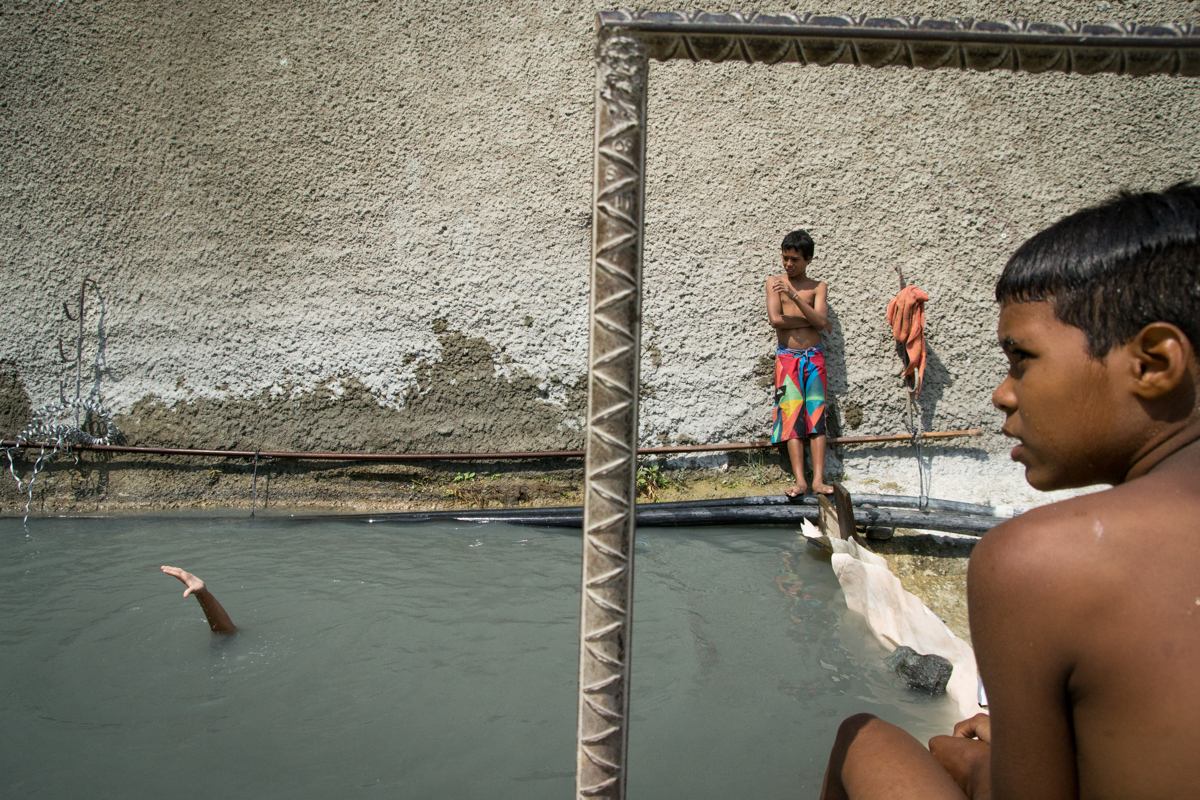
Some children battle the heat swimming in the cement pools filled with a mysterious running water that comes from pipes from inside the tunnel. Cotiza, 2019. Photo: Gustavo Vera.
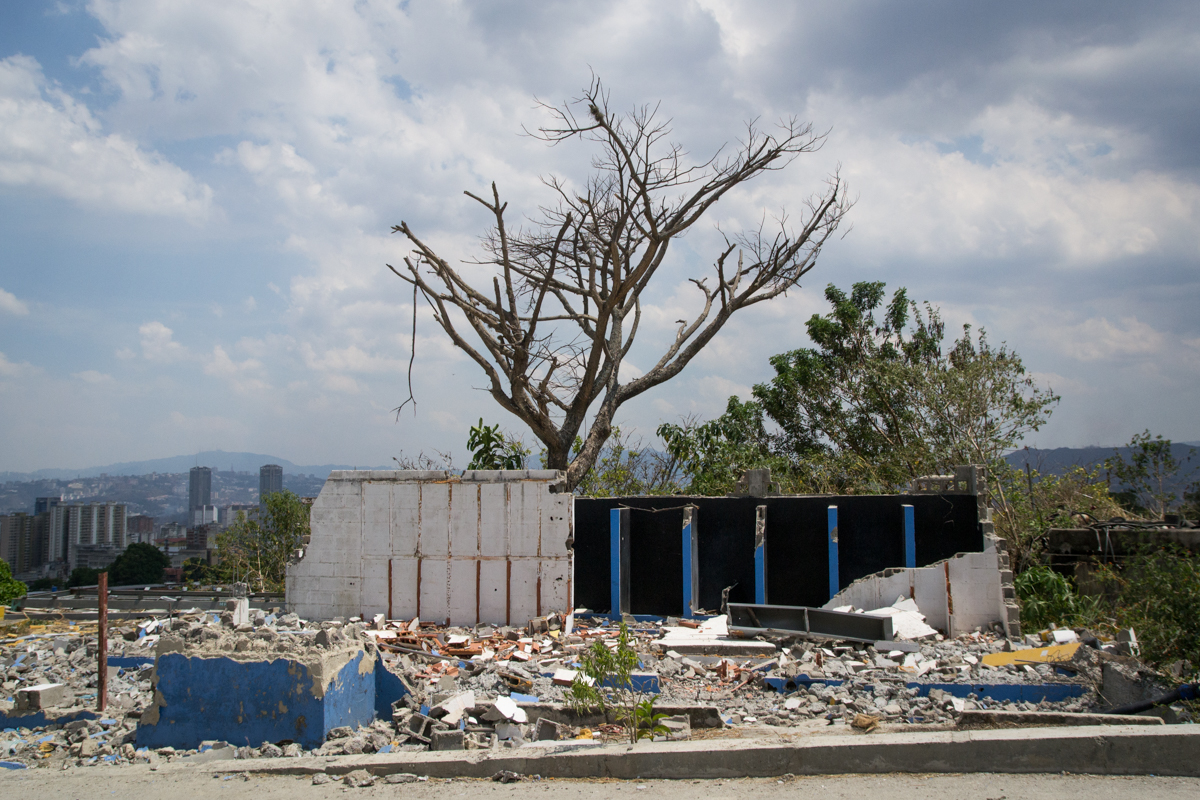
The Boyacá-La Guaira tunnel abandoned building site. Considered by some neighbours as an example of state negligence at plain sight. Cotiza, 2019. Photo: Gustavo Vera.
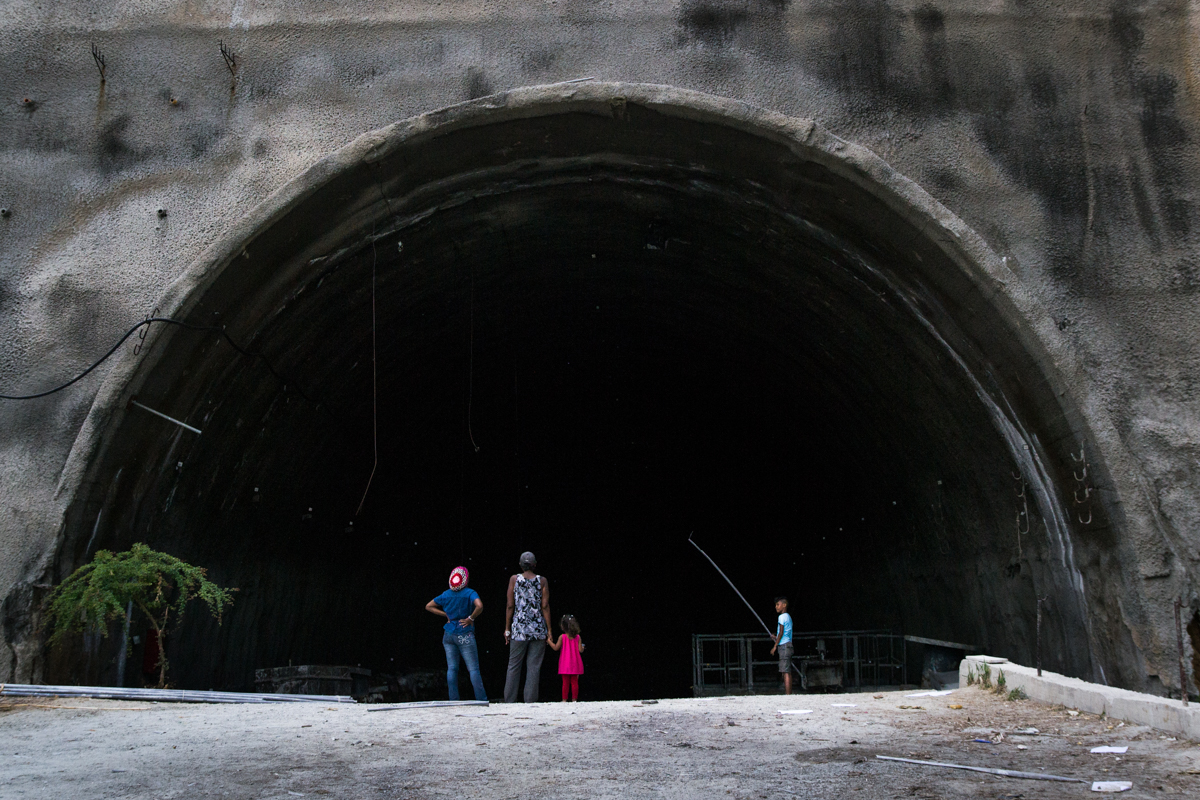
The Rodríguez Family stand in front of the Boyacá-La Guaira tunnel. Cotiza, 2019. Photo: Gustavo Vera.
On the mountain, which shows the scars of fire season, people collect fresh water, bathe, wash their clothes and cook. It’s a risky, rocky path which demands assistance to go uphill while carrying water bottles, and the neighbors have installed ropes to pull themselves along the slide.
Vicente, a 57-year-old factory worker, washes his greasy uniform in a nearby river, in a landscape where nature, modernity, and crisis collide. He believes his factory days will be over soon, and considers becoming a street hawker. “I’ve had to take stuff from my home and sit in a corner downtown to sell it. Last week, I sold my broken washing machine and a couple of potatoes. I just sit and wait. I bought some cigarettes and eggs with that money.”

A man from Cotiza washes his clothes deep inside the mountain, which burnt the night before in a fire, during a 19-days long water rationing. El Ávila, 2019. Photos: Gabriela Mesones Rojo (left), Gustavo Vera (right)
In Venezuela, people struggle to adapt to the social, political and economic changes that seize our existence. As poverty deepened and expanded, we’ve been forced to abandon the hope for normalcy. This year, comfort became barely achievable, with the collapse of basic services. Many economists are saying that this is the worst economic decline they’ve seen outside of war in the modern era; Kenneth Rogoff describes it as “a touchstone of disastrous policies for decades to come.”
This is how it looks like from the ground, in the poor community north of downtown Caracas, a few blocks away from the presidential palace, where people took to the streets to support the uprising of a small group of National Guards on January 21st. “Our salary isn’t enough, everything is expensive,” said María Fernanda to a reporter during the uprising, a pan in one hand and antiacid on her face (to fight the effects of teargas). “We have to fight for our country. We’re strong, but we’re drowning in poverty. Maduro is sitting in Miraflores, fat as ever. Meanwhile, the people are hungry.”
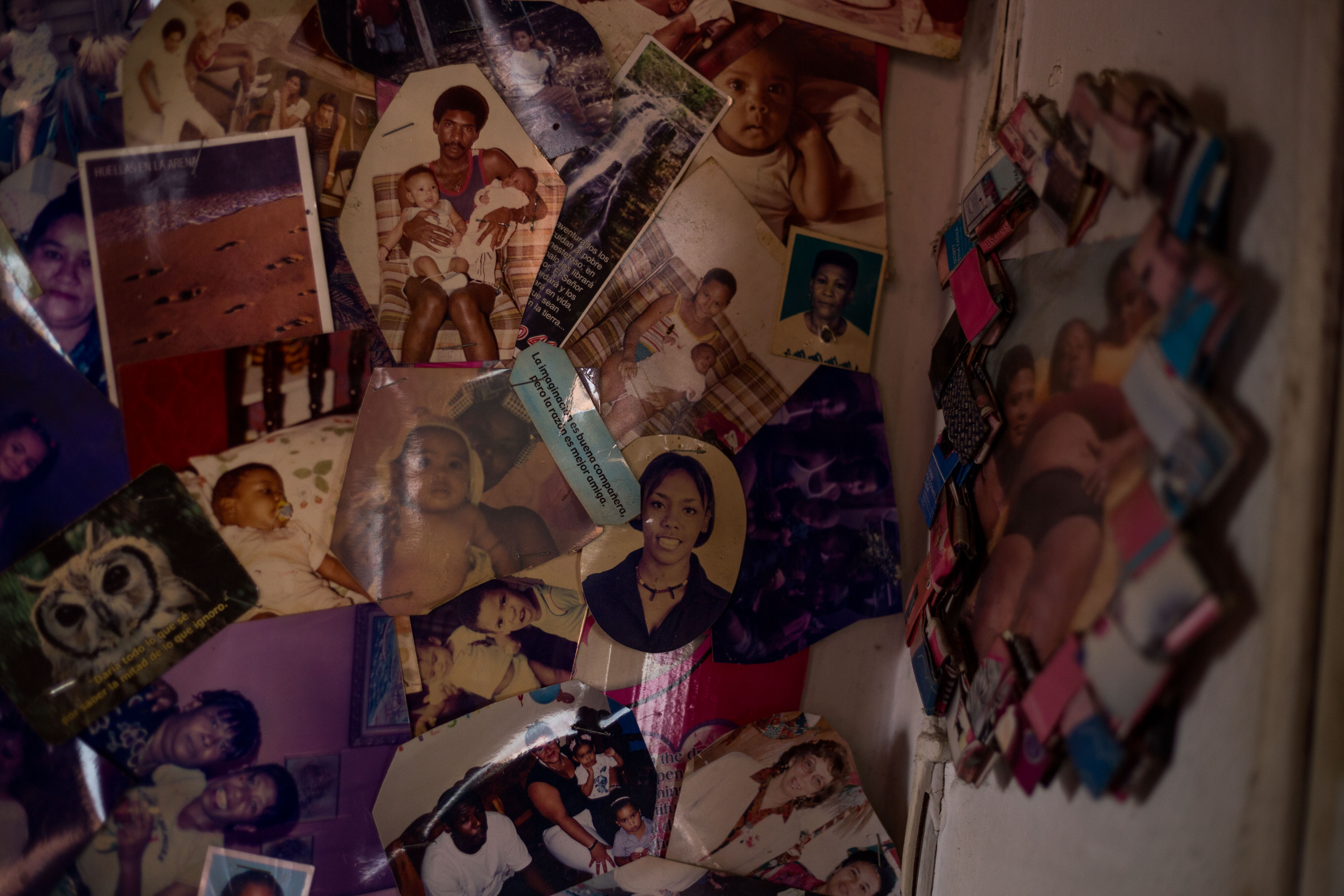
The Rodríguez Family. Cotiza, 2019. Photo: Cristian Hernández.
A shell of what life used to be
“I get sick often,” says María Fernanda, a 37-years-old hairdresser, three months after her social media shining moment. “My stomach aches for days; my daughter’s had a rash for a week.”
In the new normal, the entire barrio of Cotiza only gets running water for an hour, once a week. The Rodríguez’s home is stocked with at least a hundred water bottles, on every corner.
Iraima, María Fernanda’s mom, almost can’t believe it. “Four years ago, we were certain about what we had. We had what we needed, and a little bit more. We had food, clothes, a house we could be proud of. We’re professionals. When we wanted to relax, we went to our house in Higuerote, on the beach. We used to go every now and then. But the person we paid to take care of it stole everything we had. Life feels like that, a shell of what it used to be.”
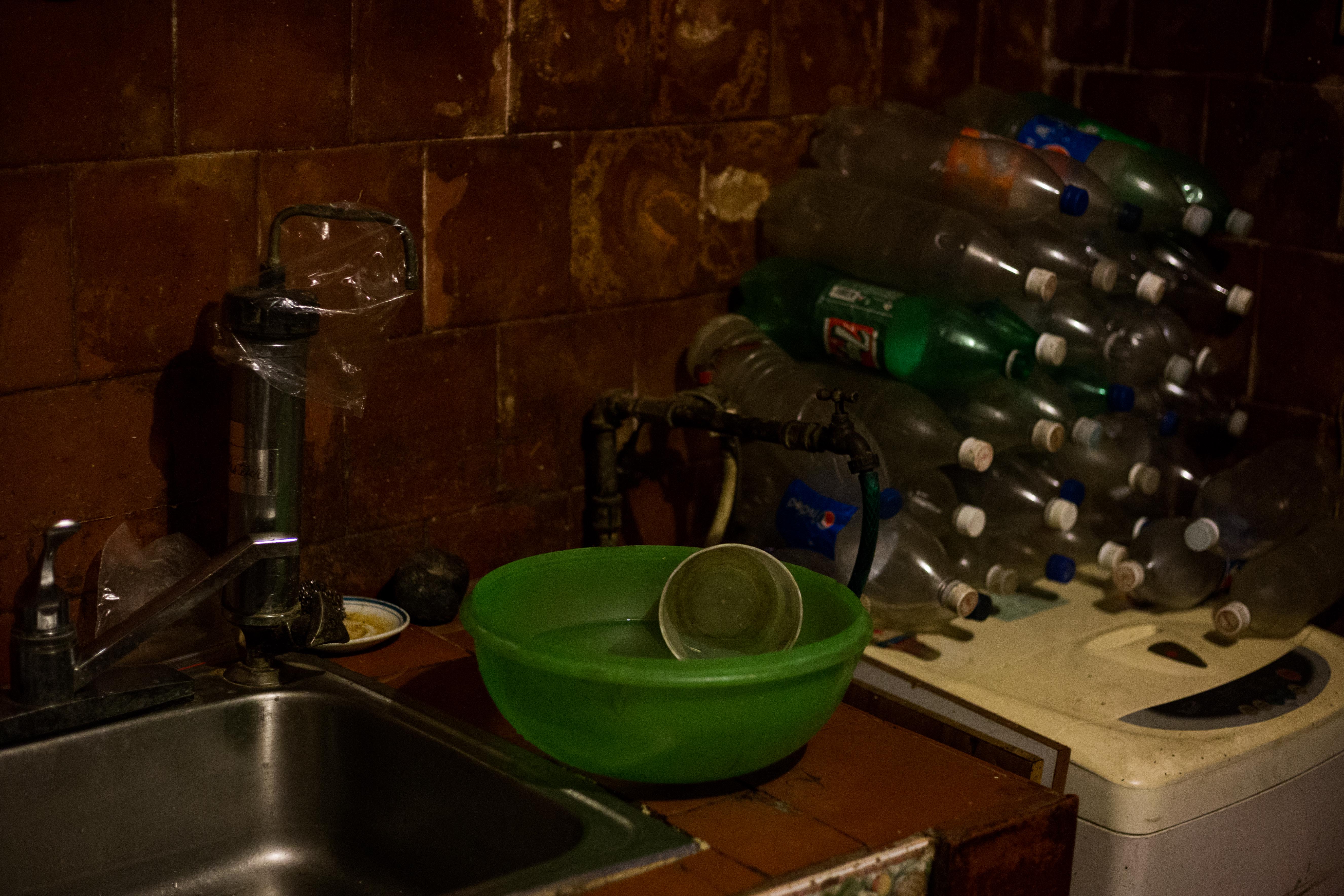
The Rodríguez family’s home is stocked with at least 100 water bottles on every corner due to the water shortages that may last weeks. Cotiza, 2019. Photo: Cristian Hernández.
The Rodríguez family has been living in the same house for the past 90 years. Back then, Cotiza was a small religious community with adobe houses. It grew with migration from the province and, by the end of the 20th century, it was an informally prosperous barrio, struck by crime and plenty of marginalized families. “When my father bought this house,” Iraima remembers while showing old pictures of her family, “it was built with mud. Then, he made the concrete walls himself. It only had a living room and the kitchen. It has grown since. We built a second and a third floor. Eight people live in this house, but we have made enough room for everyone.”
“We’ve always been poor, but we used to enjoy life. We had everything we needed. Now every minute is about finding medicine, food and water. We’ve always worked hard, but these past two years have been a blow, we’ve lost an awful lot of what we had. I lost 30 kilos in the past three years. Sometimes, I look at myself in the mirror and I can’t recognize my body. I’m someone else now.”
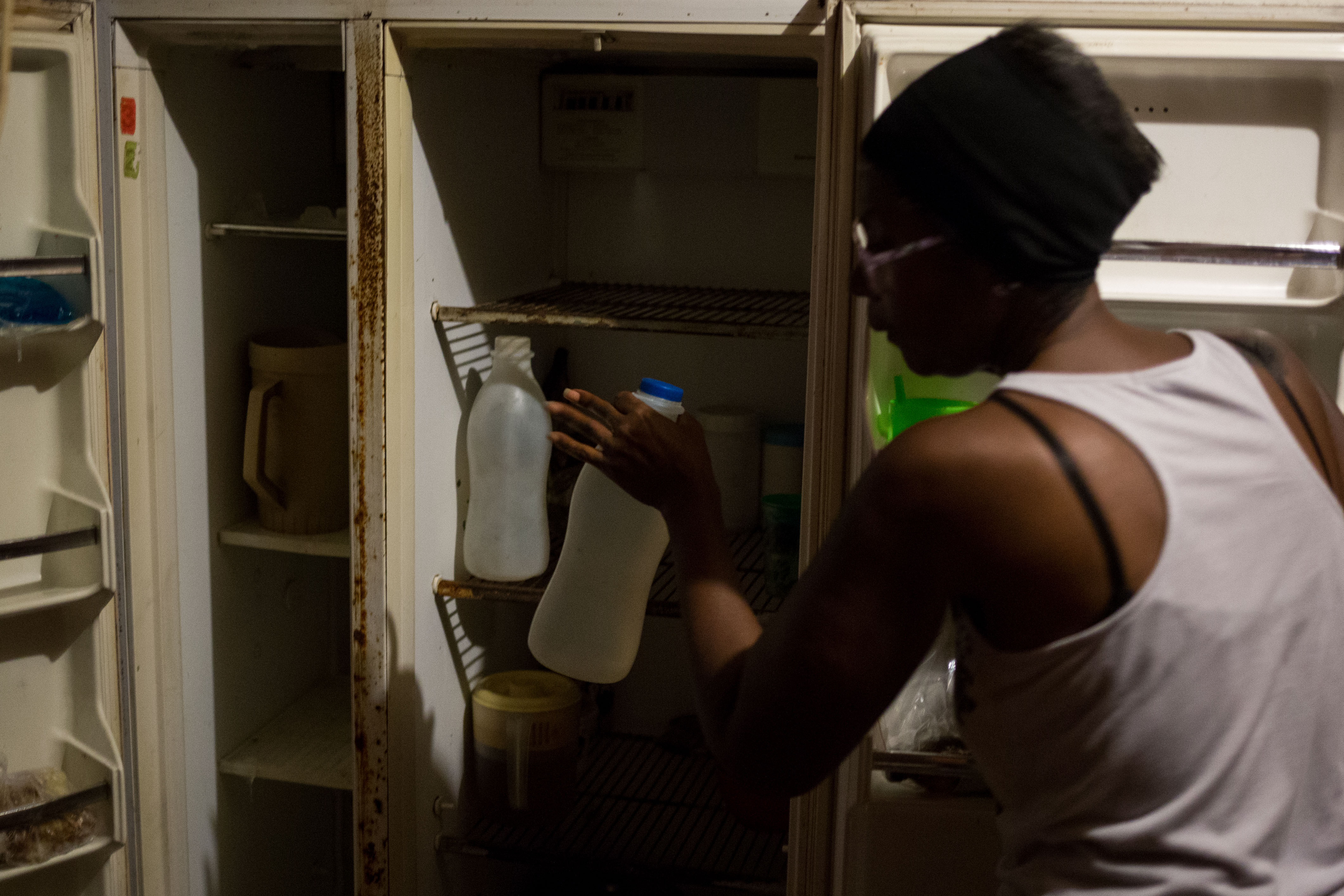
The family’s fridge is usually empty, portions have been reduced and meals aren’t a certainty. Cotiza, 2019. Photo: Cristian Hernández.
Iraima is the head of this family of female nurses and hairdressers who have seen their salary fade with time. “Today, my salary equals a can of soda. Anything other than my CLAP boxes is out of reach.”
According to the National Poll of Living Conditions (ENCOVI), 2018 ended with 48% poor households and 7,3 million Venezuelans depending on CLAP boxes to eat just once a day.
“Everything got worse after that first blackout. Everything always changes for the worse,” says Miriam, Iraima’s sister, a former nurse who now makes keychains —one of them a colorful sewn lizard, another a beaded electric blue poodle with the tongue out. While she talks, a teenager with a piece of bread under his arm says hello from the street and asks if they have food. Iraima gives him a cup of lentils and asks for a bite of bread. The fridge here is usually empty, portions have been reduced and meals aren’t a certainty. “Somehow, I think most of us manage to eat just enough.”
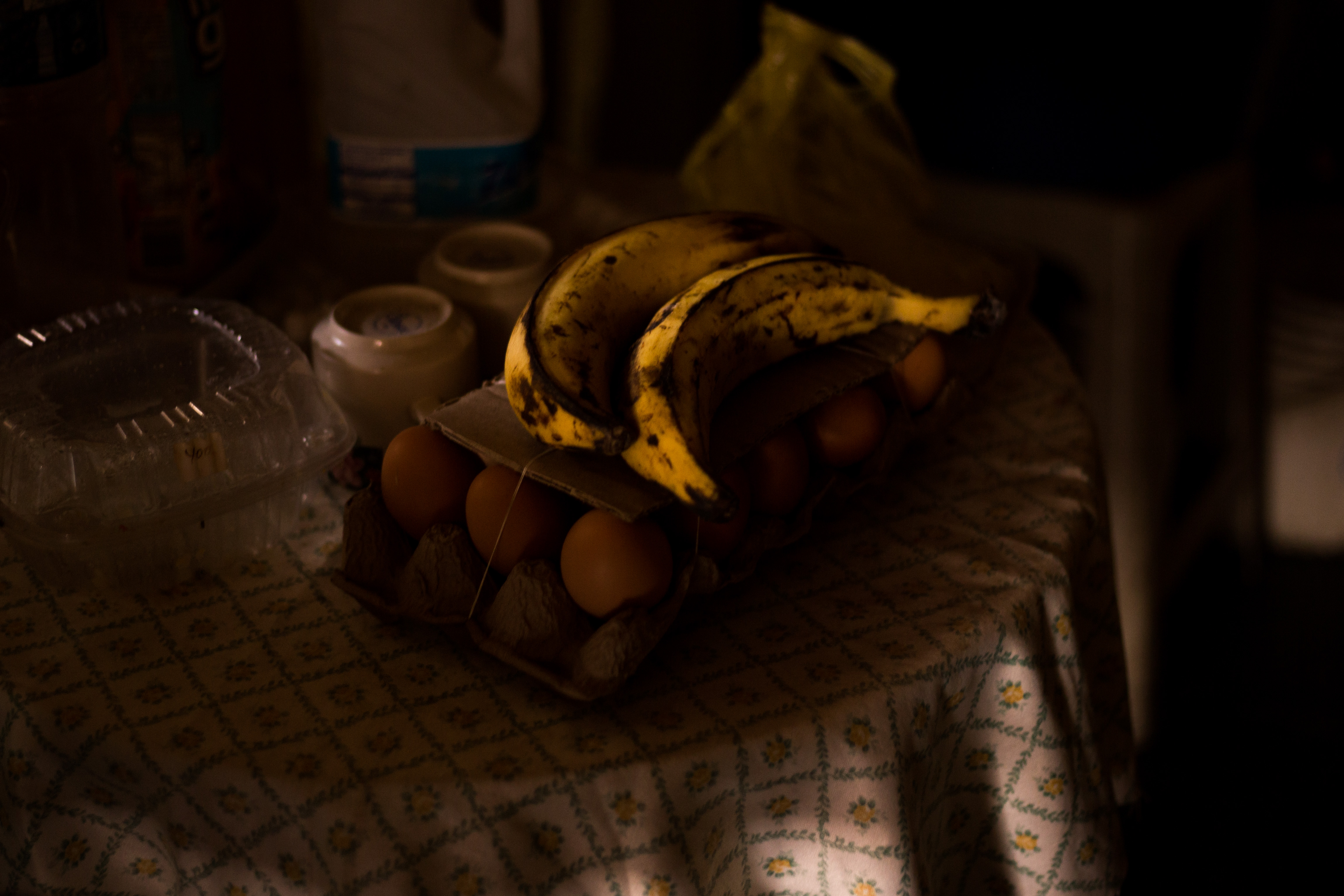
The family usually eats eggs, rice, and plantain every day. Cotiza, 2019. Photo: Cristian Hernández.
Iraima, Miriam, María Fernanda, Yamileth and Omar share the home with their children, Gabriel, Fabiola, and María. The place smells of fresh coffee and the door is open at all times. Neighbors come in without knocking, to gossip about friends and laugh at political jokes. “We’re a strong community. We care for each other and try to do the best we can, but politics has strained many friendships. This has been a Chavista barrio for a long time, and it’ll be Chavista for many years to come.”
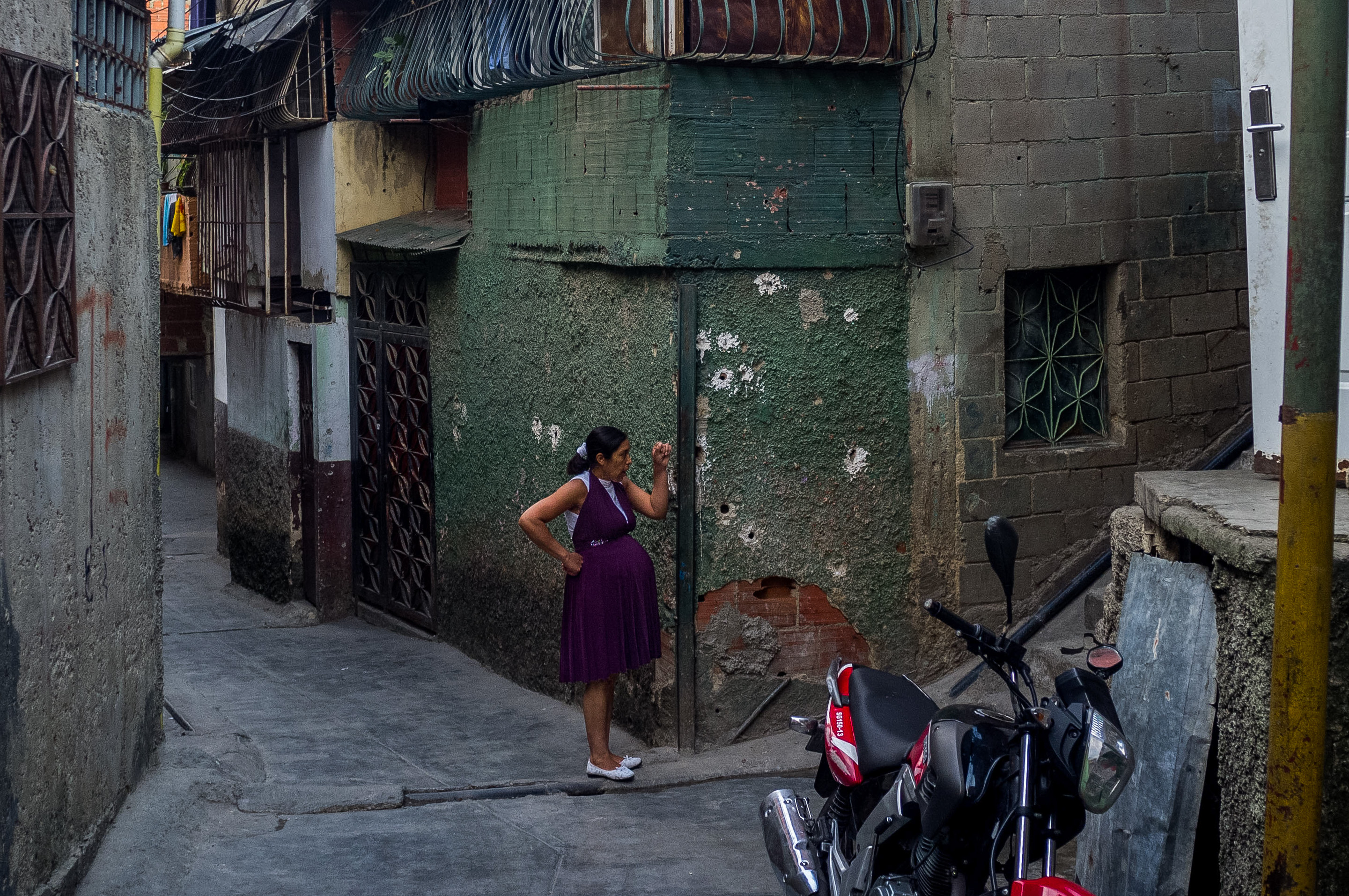
A pregnant woman walks Cotiza’s alleys and rests in front of a wall with bullet holes. Cotiza is one of Caracas’ most peaceful slums, yet the barrio gets increasing presence from security forces after the January GNB rebellion. Cotiza, 2018. Photo: Cristian Hernández.
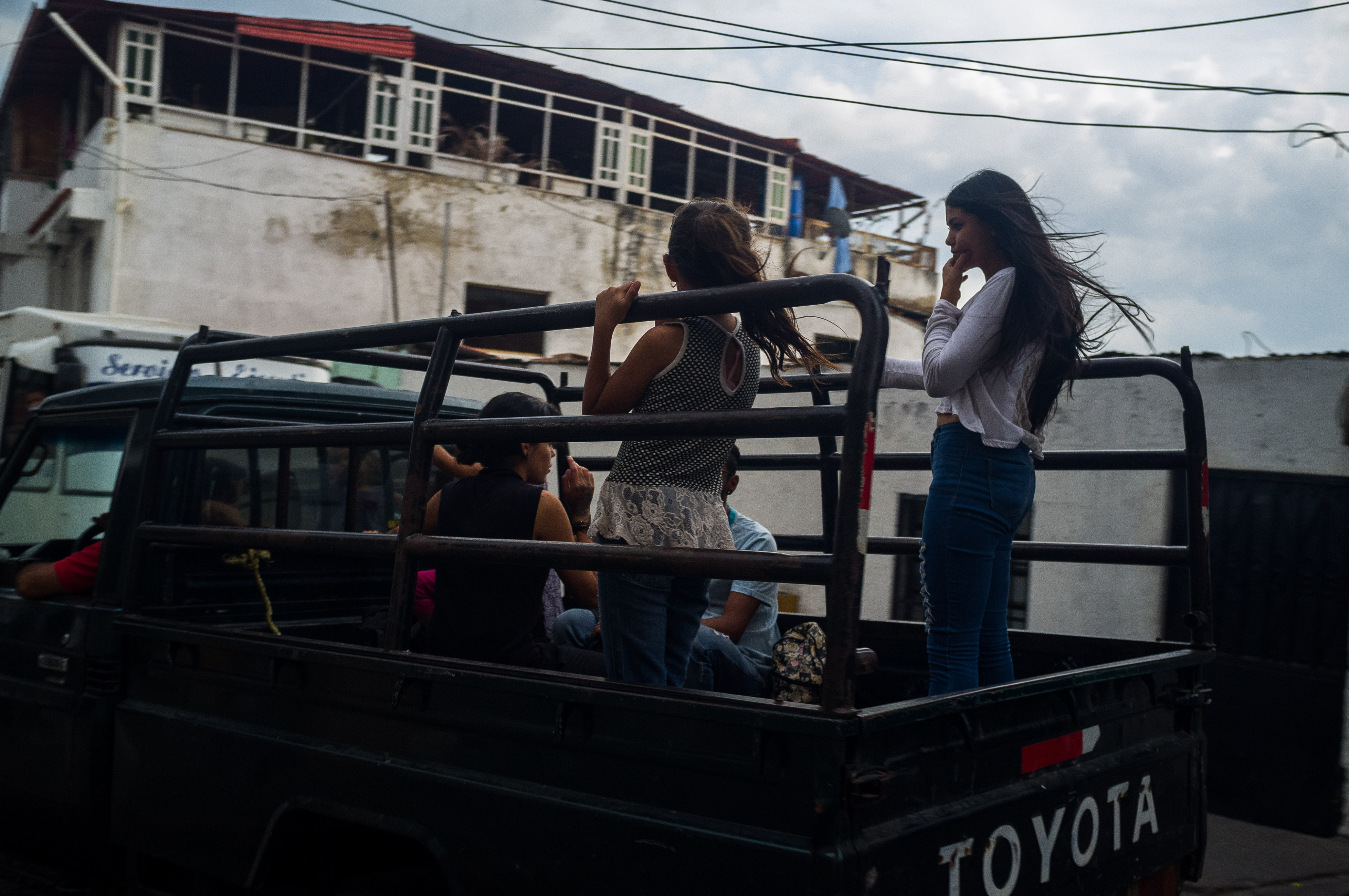
Public transport has been replaced with perreras due to car parts shortage. Cotiza, 2019. Photo: Cristian Hernández.
When Chávez saw us
Indeed, the community feels like two societies living side by side. While some blame Maduro for hunger and the progressive impoverishment, others blame the opposition. Cotiza flaunts the first Misión Vivienda complex built by Chávez on 2011, a wide complex with beautiful, spacious houses and sunny porches with plants and water tanks. Neighbors remember when Chávez arrived in Cotiza one night unannounced, after seeing the container park where families lived on the border of the Cota Mil highway.
“He saw us from the highway and asked to see up close,” says María, the mother of a die-hard Chavista and former female police officer, Bernadette. “Most of us had a home, but we were forced out due to city planning. They set us up temporarily in containers and they forgot, but Chávez saw us.”
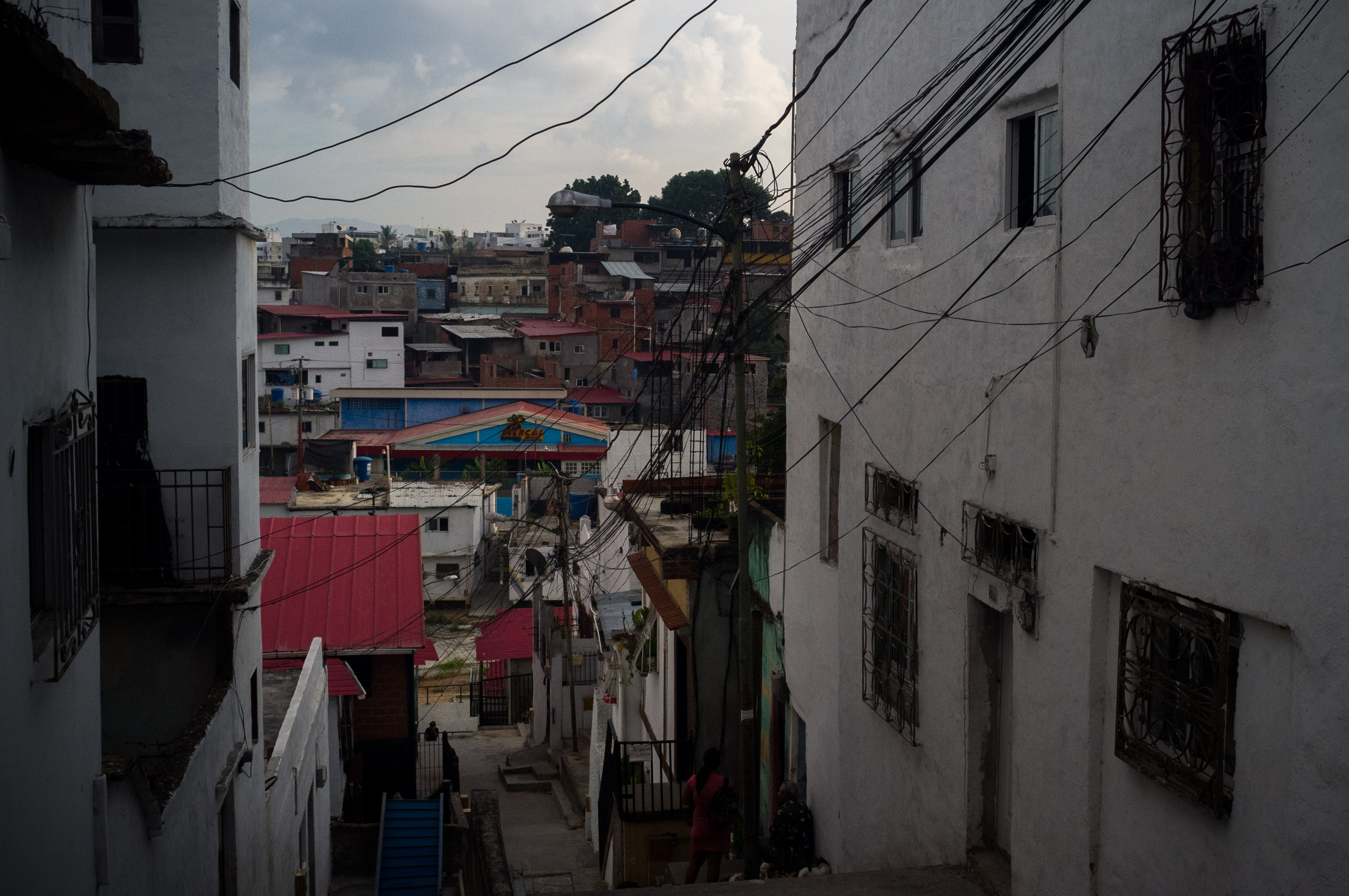
A Mercal, government food store with controlled prices and little to offer. Cotiza, 2019. Photo: Cristian Hernández.
Three generations of women live in the complex, and while Bernadette states she will never betray the commander’s legacy, her mother whispers about her support for Guaidó. Grandma Belén is not afraid to talk about what she sees every day on the streets: “Hungry children and hungry parents.”
Less than two weeks later, Belén cries the death of her 57-year-old son, due to lack of diabetes treatment. “He died at home because there was nowhere we could take him.”
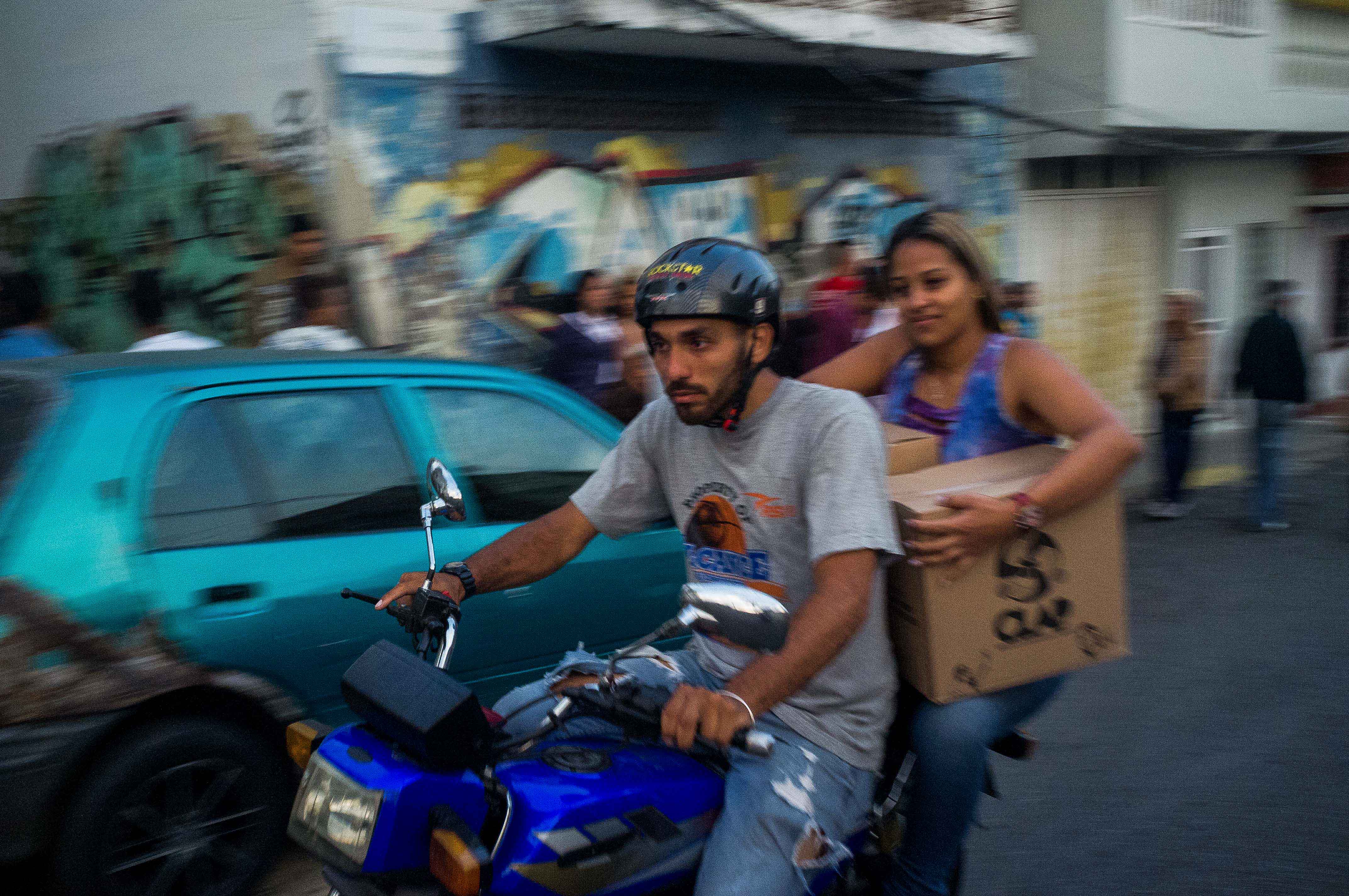
According to the National Poll of Living Conditions (ENCOVI) 2018 ended with 48% of poor homes and with 7,3 million Venezuelan who depend on CLAP boxes to eat only once a day. Cotiza, 2018. Photo: Cristian Hernández.
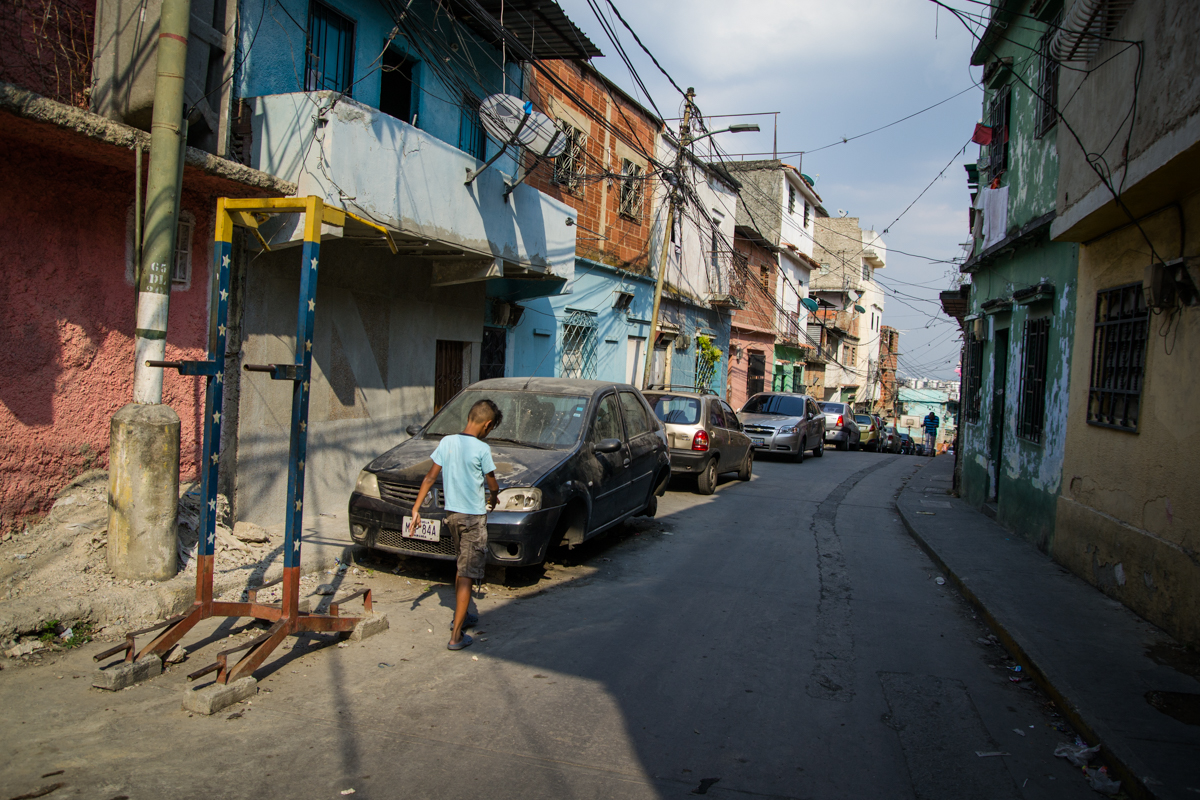
A child wanders the streets of Cotiza after school. Cotiza, 2019. Photo: Gustavo Vera.
No time to be sweet
The Rodríguez family isn’t divided by politics. “We’ve never been interested in what the government can give us. We don’t want to stop speaking our minds just because they can control us with food and fear,” says María Fernanda.
She’s a single mother with a wild spirit, a mighty voice, and a strident laughter. Neighbors recognize her braided hair and describe her as uncontainable and fierce. “My mother and aunt taught me that strength is built slowly. We’ll need all the strength we can gather to keep going, and we have to toughen up the children.”
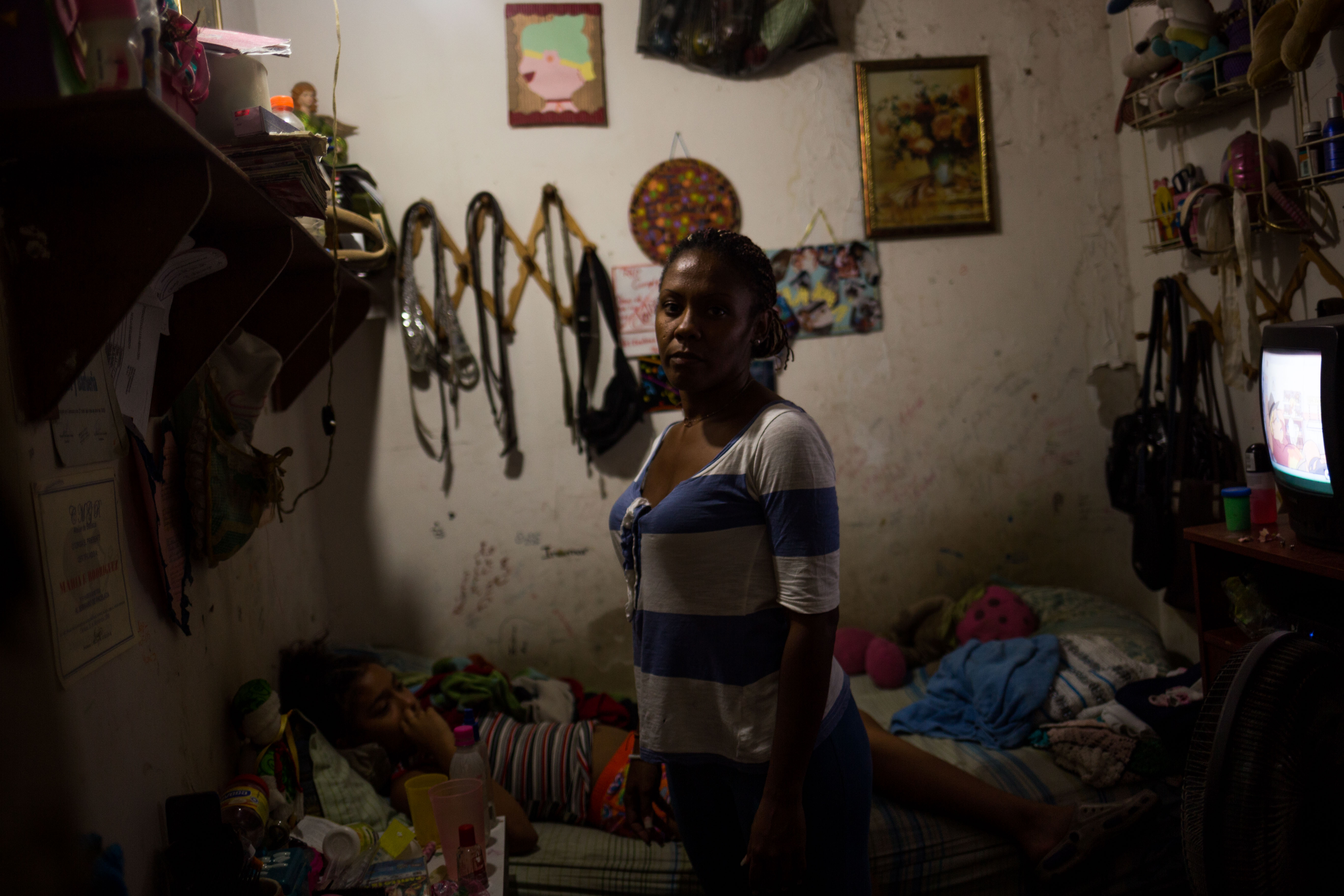
Maria Fernanda Rodríguez and her daughter in her room. Cotiza, 2019. Photo: Cristian Hernández.
“Children always eat first, and often they’re the only ones who eat,” says Iraida. Two of the three kids that live here go to school only three times a week. Fabiola, the four-year-old, doesn’t, because she has no papers. “My son couldn’t fight drug addiction. He ended up in jail for a long time. His girlfriend showed up in my house one day, asking me to take care of Fabiola for the afternoon. The baby was only three months old. Her mother went to Colombia without telling us, and stayed there for longer than she thought. She was attacked and beaten by prostitutes working at her club.”
Fabiola has lived with them since, and Iraima is her new mother. She likes selfies, plantain tajadas, and adventures.
“She worries me sometimes,” says Iraima. “She’s too sweet. She wants to hug and kiss everyone, even strangers. These aren’t times to be sweet.”
Street cigarettes
Omar’s 60th birthday is on March 22nd. He’s tall and slim, and walks with wide open eyes and a stick. He was diagnosed with glaucoma four years ago and can’t find his medicine anymore. He lost his sight in less than three months, while his family endured the decay and Iraima, his sister and ophthalmic nurse, tried to find a contact that could help.
He sleeps in a white room and kills time with a broken TV that plays as a radio. “When I was a child, I wanted to be a musician. I love the sound of drums, love playing them. If I were a child again, I wouldn’t know what my choices are. I’ve lost sight of what a normal, working, happy life should look like.”
Omar has acute pain due to his ocular high pressure. His doctors at the Risquez Hospital currently recommend to remove his eyes altogether, to stop that pain. “Removing the eyes is the last option,” says Rosaury Espiño, an optometrist specialized in low vision. “It’s very hard on the patients, so it’s what doctors recommend only when there’s absolutely nothing else to do.”
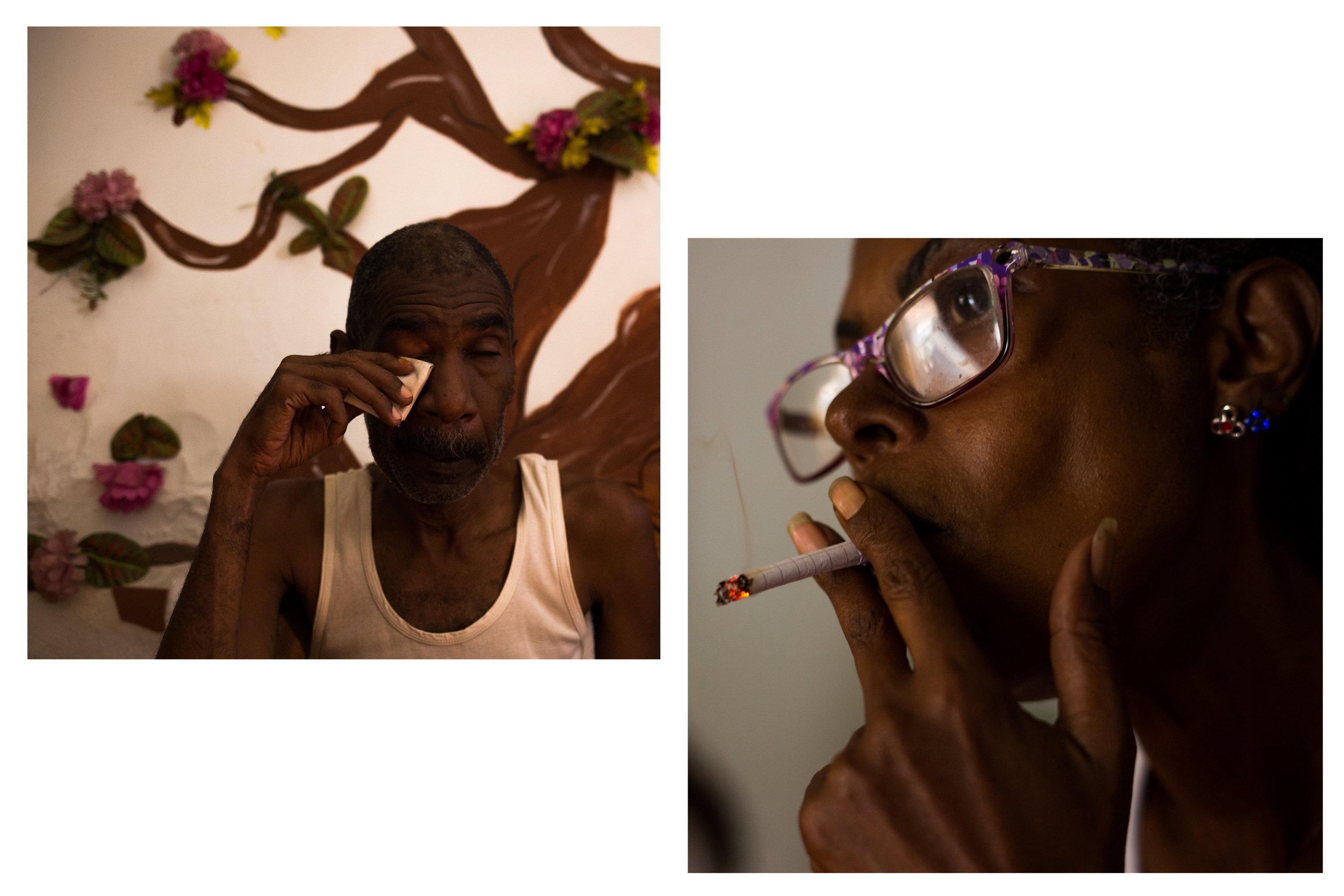
Omar Rodríguez has lost his sight due to untreated glaucoma after more than a year without access to medicine. Iraima Rodríguez smokes a homemade cigarette. Cotiza, 2019. Photo: Cristian Hernández.
Poverty, wrote Ryzsard Kapuzcinski, can be vastly defined as the lack of choices, the shrinking of a world and its possibilities, the claustrophobia left behind from the withdrawal. In her autobiography, Choices, Liv Ullman remembers her volunteering missions in Africa, and describes a mother who is confronted with a choice, as she stood and stared at a water pond with her crying child in her arms. The mother waited, prolonging the inevitable: to give contaminated water to the child, or let it die of thirst.
The Rodríguez family celebrated Omar’s birthday without cake or rum, but with a big lunch of rice, fried eggs and lentils. He smiles often, but is skeptical about anyone’s good intentions. “We have seen what people can do when they are in need. We’re all responsible, one way or another, of having the country we have today. We deserve it. We made all the wrong decisions.”
After lunch, when Iraima pours the fresh coffee, they talk about past lovers, heartbreak, and romance. Iraima remembers a long-distance affair with a handsome, sweet guy from Barinas. María Fernanda is careless about romance, “men are useless,” she says. “I don’t think there’s anything a man can give me that I can’t find myself,” Miriam remembers her husband’s death and the inescapable grief she encountered after his passing. She had quit smoking but resumed at her husband’s burial.
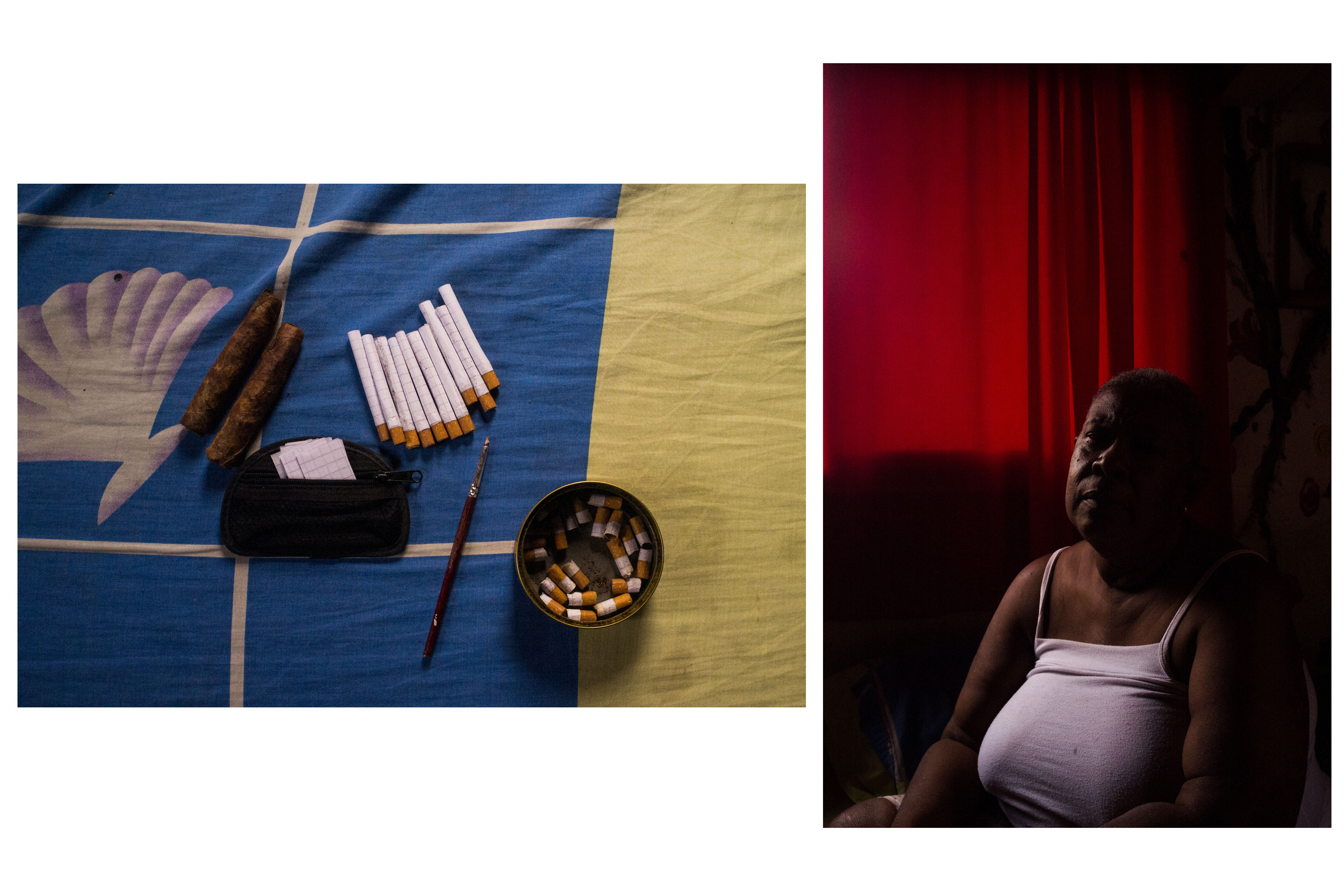
Miriam Rodríguez makes homemade cigarettes from used butts, paper, glue, and cheap tobacco. Cotiza, 2019. Photo: Cristian Hernández.
Meanwhile, she takes out her homemade cigarettes. A new pack goes for $3, but she can make 17 tobacco joints with one cigarette and filters she picks up from the street. Her homemade cigarettes taste like ash, humid tobacco and rain, but we still smoke one after the other. “When we talk about heartbreak, we smoke like chimneys,” she says.
“So, should we smoke less, or should we stop talking about love?” asks Iraima, with the widest of smiles.
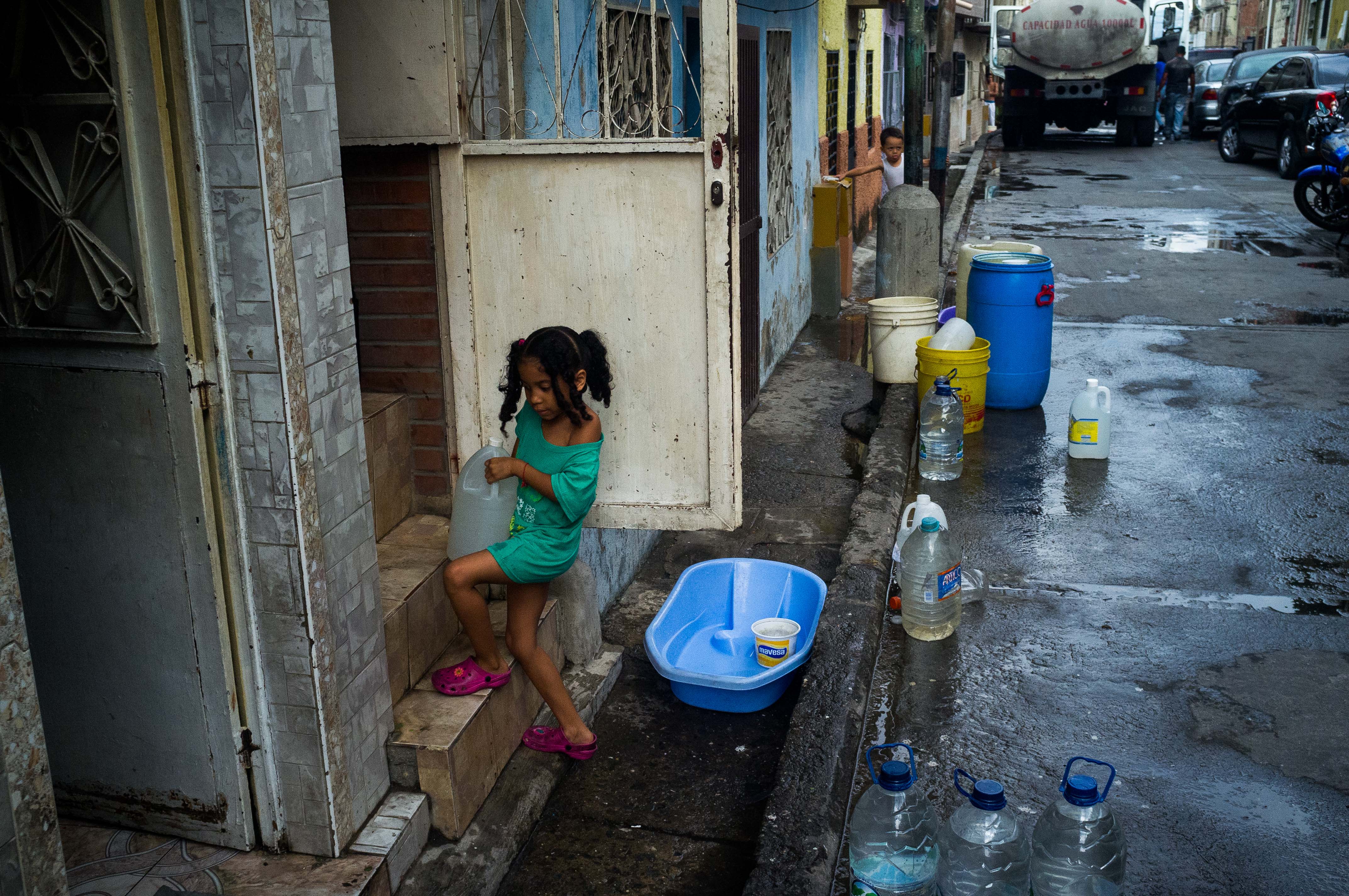
A girl carries water from a private water tank, payed for by neighbours from one street in Cotiza after a 6 day long water ratioting. A water tank may cost up to 20$. Cotiza, 2019. Photo: Cristian Hernández.
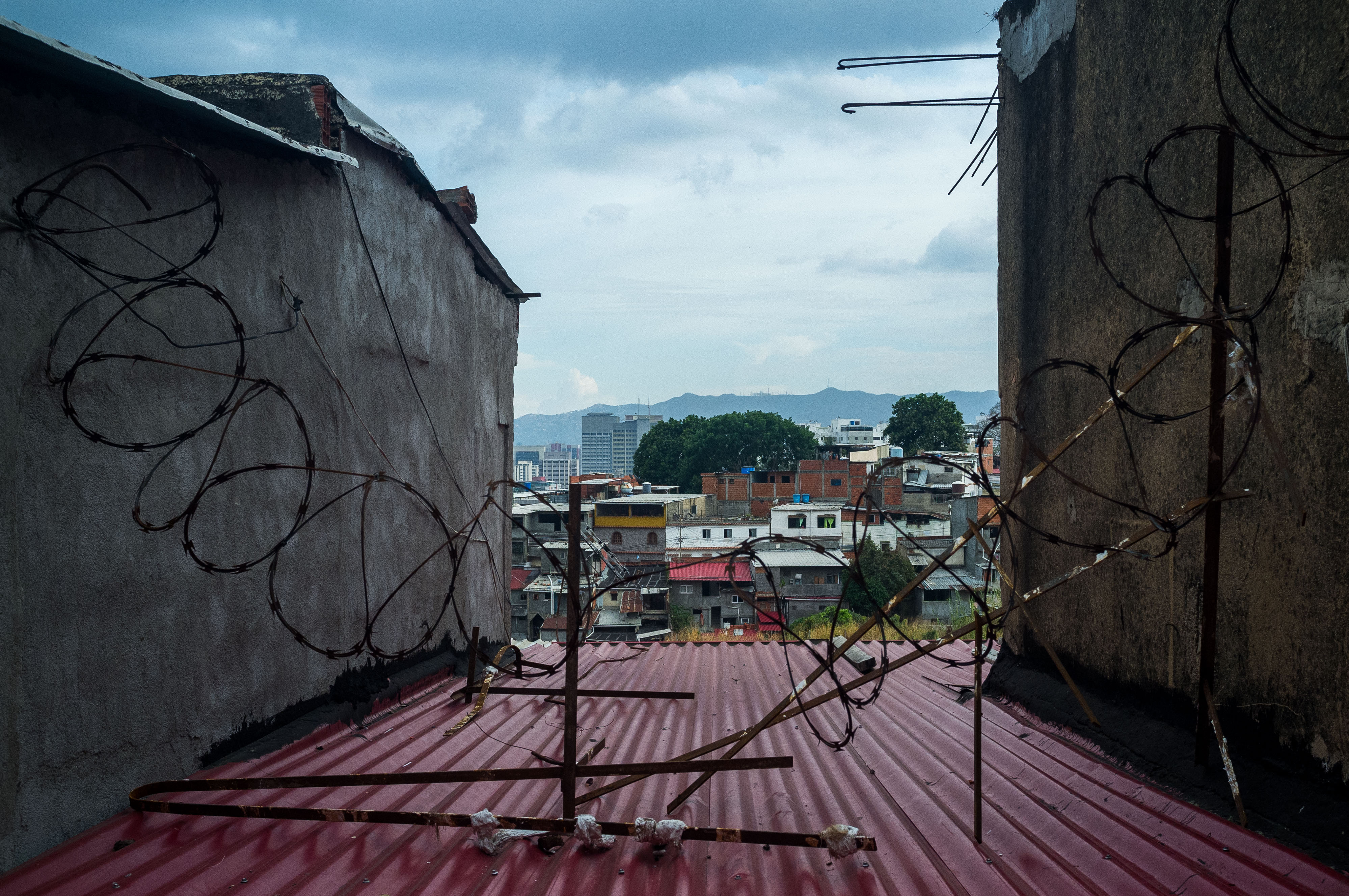
View from Cotiza. 2019. Photo: Cristian Hernández.
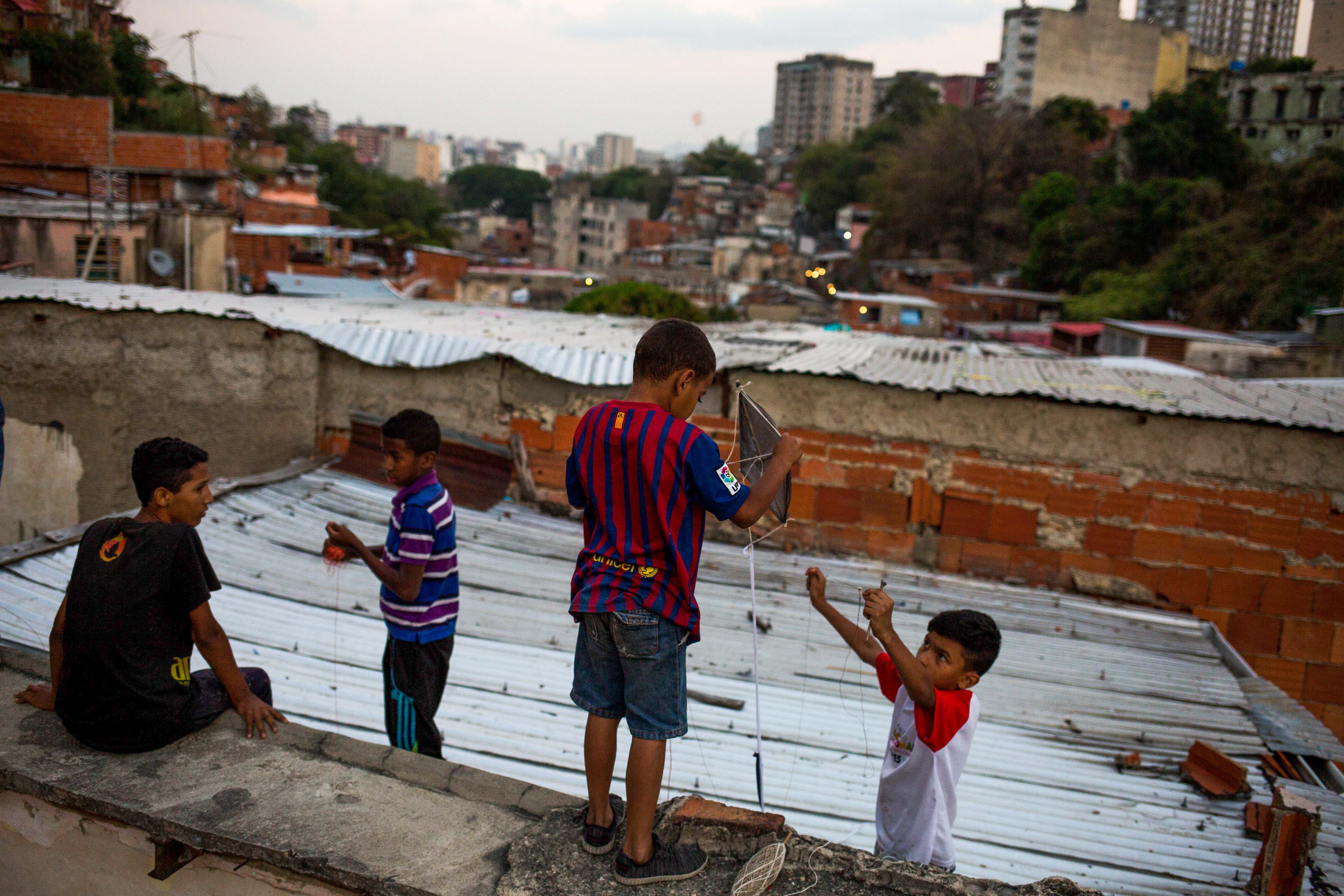
Children play with a home made kite before sunset. Cotiza, 2018. Photo: Cristian Hernández.
Caracas Chronicles is 100% reader-supported.
We’ve been able to hang on for 22 years in one of the craziest media landscapes in the world. We’ve seen different media outlets in Venezuela (and abroad) closing shop, something we’re looking to avoid at all costs. Your collaboration goes a long way in helping us weather the storm.
Donate




